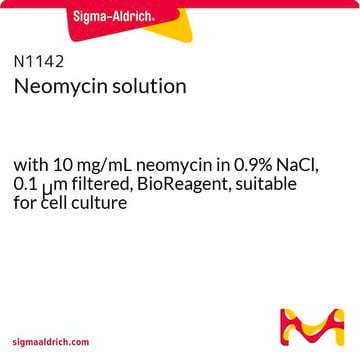10843555001
Roche
Hygromycin B
from Streptomyces hygroscopicus
Synonym(s):
Hygromycin B from Streptomyces hygroscopicus
About This Item
Recommended Products
biological source
Streptomyces hygroscopicus
sterility
non-sterile; 0.2 μm filtered
Assay
80% (HPLC)
form
buffered aqueous solution
composition
Hygromycin B, >80% HPLC
packaging
pkg of 20 mL (1 g)
manufacturer/tradename
Roche
concentration
50 mg/mL
technique(s)
transfection: suitable
SMILES string
CN[C@H]1C[C@@H](N)[C@H](O)[C@@H](O[C@@H]2O[C@H](CO)[C@H](O)[C@@H]3O[C@]4(O[C@H]([C@H](N)CO)[C@H](O)[C@H](O)[C@H]4O)O[C@H]23)[C@@H]1O
InChI
1S/C20H37N3O13/c1-23-7-2-5(21)9(26)15(10(7)27)33-19-17-16(11(28)8(4-25)32-19)35-20(36-17)18(31)13(30)12(29)14(34-20)6(22)3-24/h5-19,23-31H,2-4,21-22H2,1H3/t5-,6-,7+,8-,9+,10-,11+,12-,13+,14-,15-,16+,17+,18-,19+,20+/m1/s1
InChI key
GRRNUXAQVGOGFE-XKIAHZFYSA-N
Looking for similar products? Visit Product Comparison Guide
General description
- Formula: C20H37N3O13
- LD50: 6 mg/kg in mouse (i.v.);13 mg/kg in guinea pig (i.p.); 63 mg/kg in rat (i.p.)
- Molecular weight: Mr = 527.5
- Working concentration: 50 - 1,000 μg/ml in cell culture. A commonly used concentration for the selection of mammalian cells is 200 μg/ml. However, the optimal concentration must be experimentally determined, since it may vary depending on the type of cell used.
Application
Biochem/physiol Actions
Antimicrobial Spectrum: Hygromycin B acts against bacteria, fungi and higher eukaryotic cells.
Quality
Unit Definition
We do not have this information.
Physical form
Preparation Note
Storage and Stability
Other Notes
Signal Word
Danger
Hazard Statements
Hazard Classifications
Acute Tox. 1 Inhalation - Acute Tox. 3 Oral - Acute Tox. 4 Dermal - Eye Dam. 1 - Resp. Sens. 1 - Skin Sens. 1
Storage Class Code
6.1D - Non-combustible acute toxic Cat.3 / toxic hazardous materials or hazardous materials causing chronic effects
WGK
WGK 1
Flash Point(F)
does not flash
Flash Point(C)
does not flash
Certificates of Analysis (COA)
Search for Certificates of Analysis (COA) by entering the products Lot/Batch Number. Lot and Batch Numbers can be found on a product’s label following the words ‘Lot’ or ‘Batch’.
Already Own This Product?
Find documentation for the products that you have recently purchased in the Document Library.
Customers Also Viewed
Articles
Antibiotic kill curve is a dose response experiment in which mammalian cells are subjected to increasing amounts of selection antibiotic
Antibiotic kill curve is a dose response experiment in which mammalian cells are subjected to increasing amounts of selection antibiotic
Antibiotic kill curve is a dose response experiment in which mammalian cells are subjected to increasing amounts of selection antibiotic
Antibiotic kill curve is a dose response experiment in which mammalian cells are subjected to increasing amounts of selection antibiotic
Our team of scientists has experience in all areas of research including Life Science, Material Science, Chemical Synthesis, Chromatography, Analytical and many others.
Contact Technical Service








